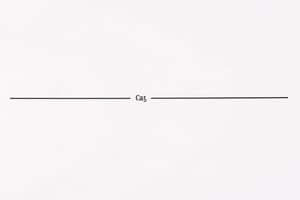Podcast
Questions and Answers
What is reaction rate?
What is reaction rate?
- The change in concentration of a reactant or product per unit temperature
- The change in concentration of a reactant or product per unit mass
- The change in concentration of a reactant or product per unit time (correct)
- The change in concentration of a reactant or product per unit volume
How can rates of reactions be determined?
How can rates of reactions be determined?
- By monitoring the change in temperature of the reactants or products as a function of time
- By monitoring the change in concentration of either reactants or products as a function of time (correct)
- By monitoring the change in pressure of the reactants or products as a function of time
- By monitoring the change in volume of the reactants or products as a function of time
What is the concept of reaction rate related to?
What is the concept of reaction rate related to?
- Change in volume of reactants or products
- Change in concentration of reactants or products (correct)
- Change in temperature of reactants or products
- Change in mass of reactants or products
What are the types of rate laws used to recognize reaction rates?
What are the types of rate laws used to recognize reaction rates?
What is the unit of reaction rate?
What is the unit of reaction rate?
Who is the lecturer for Pharmaceutical Organic Chemistry 1 (PC 102) Level 1(2023) Lab Section 1?
Who is the lecturer for Pharmaceutical Organic Chemistry 1 (PC 102) Level 1(2023) Lab Section 1?
What is the first topic covered in the practical course curriculum for Pharmaceutical Organic Chemistry 1?
What is the first topic covered in the practical course curriculum for Pharmaceutical Organic Chemistry 1?
What is the recommended attire for the chemistry lab?
What is the recommended attire for the chemistry lab?
How many TA's are mentioned in the Pharmaceutical Chemistry Department costaff?
How many TA's are mentioned in the Pharmaceutical Chemistry Department costaff?
What is the last safety precaution mentioned for the chemistry lab?
What is the last safety precaution mentioned for the chemistry lab?
Flashcards are hidden until you start studying
Study Notes
Reaction Rate
- Reaction rate refers to the speed at which a chemical reaction occurs, typically measured as the change in concentration of reactants or products over time.
Determining Reaction Rates
- Rates of reactions can be determined by measuring the concentration of reactants or products at various time intervals during the reaction.
Concept of Reaction Rate
- The concept of reaction rate is closely related to factors influencing the speed of reactions, such as temperature, concentration, surface area, and the presence of catalysts.
Types of Rate Laws
- Rate laws are mathematical expressions that relate the rate of a reaction to the concentration of its reactants. Key types include zero-order, first-order, and second-order rate laws.
Unit of Reaction Rate
- The unit of reaction rate is typically expressed in molarity per second (M/s), indicating the change in molarity of a reactant or product over a time period.
Lecturer for Pharmaceutical Organic Chemistry 1
- The lecturer for Pharmaceutical Organic Chemistry 1 (PC 102) Level 1 (2023) Lab Section 1 is Dr. Idrees.
First Topic in Practical Course Curriculum
- The first topic covered in the practical course curriculum for Pharmaceutical Organic Chemistry 1 focuses on "Laboratory Safety and Procedures".
Recommended Attire for Chemistry Lab
- Recommended attire for the chemistry lab includes wearing a lab coat, safety goggles, and closed-toe shoes to ensure safety during experiments.
Number of TAs in Pharmaceutical Chemistry Department
- There are three teaching assistants (TAs) mentioned in the Pharmaceutical Chemistry Department staff for the 2023 session.
Last Safety Precaution for Chemistry Lab
- The last safety precaution mentioned for the chemistry lab emphasizes the importance of knowing the location of emergency equipment, such as eyewash stations and fire extinguishers.
Studying That Suits You
Use AI to generate personalized quizzes and flashcards to suit your learning preferences.




